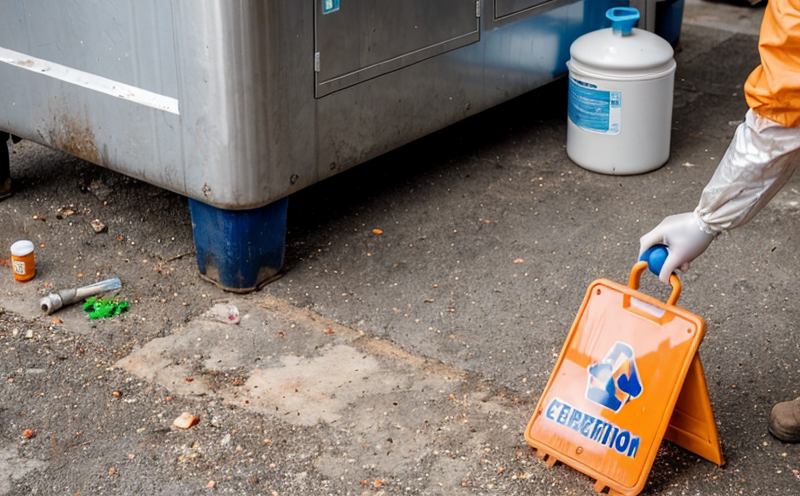
-
Consumer Product Safety-
Certification for Product Safety in Chemicals-
Certification for Safe Chemical Disposal
We provide comprehensive solutions designed to help our clients mitigate risks, enhance performance, and excel in key areas such as quality, health & safety, environmental sustainability, and social responsibility.
Discover
For many years, our organization has been operating successfully, boasting modern laboratories that meet international standards. These laboratories are equipped with the latest technology devices and equipment, and we have built a strong team of experienced and trained personnel to operate them.
DiscoverWelcome to Eurolab, your partner in pioneering solutions that encompass every facet of life. We are committed to delivering comprehensive Assurance, Testing, Inspection, and Certification services, empowering our global clientele with the ultimate confidence in their products and processes.
Discover
-
Consumer Product Safety-
Certification for Product Safety in Chemicals-
Certification for Safe Chemical DisposalCertification for Safe Chemical Disposal: A Comprehensive Guide
The safe disposal of chemicals is a critical concern in various industries, including healthcare, manufacturing, and research. Improper disposal can lead to environmental pollution, harm to humans and animals, and even pose significant risks to the economy. In this article, we will delve into the importance of certification for safe chemical disposal and explore the necessary steps to achieve it.
Why Certification is Crucial
Chemical waste management involves complex procedures that require specialized knowledge and expertise. Chemicals can be hazardous in various ways, such as being toxic, corrosive, flammable, or explosive. If not disposed of correctly, these chemicals can contaminate soil, waterways, and air, causing irreparable harm to ecosystems and human health.
According to the Environmental Protection Agency (EPA), an estimated 75 of hazardous waste is generated by industrial processes. The healthcare industry alone generates over 2 billion pounds of medical waste annually, with much of it being toxic chemicals. Inadequate disposal methods can lead to the leakage of toxins into water sources, posing significant risks to public health.
Certification for safe chemical disposal ensures that individuals and organizations handling hazardous materials possess the necessary knowledge and skills to manage these substances safely. This is particularly essential in industries where exposure to chemicals is unavoidable, such as healthcare workers, emergency responders, or laboratory personnel.
Understanding the Certification Process
The certification process typically involves several steps:
\
Store hazardous materials separately from non-hazardous substances
Label containers with clear identification and warning signs
Keep emergency equipment, such as fire extinguishers and first aid kits, readily available
Conduct regular inspections to identify potential hazards

Agricultural Equipment Certification
Agricultural equipment certification is a process that ensures agricultural machinery meets specific...

Aviation and Aerospace Testing
Aviation and Aerospace Testing: Ensuring Safety and Efficiency The aviation and aerospace industr...

Construction and Engineering Compliance
Construction and Engineering Compliance: Ensuring Safety, Quality, and Regulatory Adherence In the ...

Fire Safety and Prevention Standards
Fire Safety and Prevention Standards: Protecting Lives and Property Fire safety and prevention stan...

Consumer Product Safety
Consumer Product Safety: Protecting Consumers from Harmful Products As a consumer, you have the rig...

Environmental Simulation Testing
Environmental Simulation Testing: A Comprehensive Guide In todays world, where technology is rapidl...

IT and Data Center Certification
IT and Data Center Certification: Understanding the Importance and Benefits The field of Informatio...

Energy and Sustainability Standards
In today’s rapidly evolving world, businesses face increasing pressure to meet global energy a...

Battery Testing and Safety
Battery Testing and Safety: A Comprehensive Guide As technology continues to advance, battery-power...

Healthcare and Medical Devices
The Evolution of Healthcare and Medical Devices: Trends, Innovations, and Challenges The healthcare...

Cosmetic Product Testing
The Complex World of Cosmetic Product Testing The cosmetics industry is a multi-billion-dollar ma...

Pressure Vessels and Installations Testing
Pressure Vessels and Installations Testing Pressure vessels are a critical component of various ind...

NEBS and Telecommunication Standards
Network Equipment Building System (NEBS) and Telecommunication Standards The Network Equipment Bu...

Transportation and Logistics Certification
Transportation and Logistics Certification: A Comprehensive Guide The transportation and logistics ...

Hospitality and Tourism Certification
Hospitality and Tourism Certification: Unlocking Opportunities in the Industry The hospitality and ...

Trade and Government Regulations
Trade and government regulations play a vital role in shaping the global economy. These regulations ...

Electrical and Electromagnetic Testing
Electrical and Electromagnetic Testing: A Comprehensive Guide Introduction Electrical and electrom...

Product and Retail Standards
Product and Retail Standards: Ensuring Quality and Safety for Consumers In todays competitive marke...

Automotive Compliance and Certification
Automotive Compliance and Certification: Ensuring Safety and Efficiency The automotive industry is ...

Lighting and Optical Device Testing
Lighting and Optical Device Testing: Ensuring Performance and Safety Lighting and optical devices a...

Food Safety and Testing
Food Safety and Testing: Ensuring the Quality of Our Food As consumers, we expect our food to be sa...

Electromechanical Safety Certification
Electromechanical Safety Certification: Ensuring Compliance and Protecting Lives In todays intercon...

Renewable Energy Testing and Standards
Renewable Energy Testing and Standards: Ensuring a Sustainable Future The world is rapidly transiti...

Chemical Safety and Certification
Chemical safety and certification are critical in ensuring the safe management of products and proce...

Industrial Equipment Certification
Industrial equipment certification is a critical process that ensures industrial equipment meets spe...

Environmental Impact Assessment
Environmental Impact Assessment: A Comprehensive Guide Environmental Impact Assessment (EIA) is a c...

Pharmaceutical Compliance
Pharmaceutical compliance refers to the adherence of pharmaceutical companies and organizations to l...

Railway Industry Compliance
Railway Industry Compliance: Ensuring Safety and Efficiency The railway industry is a critical comp...

MDR Testing and Compliance
MDR Testing and Compliance: A Comprehensive Guide The Medical Device Regulation (MDR) is a comprehe...

Military Equipment Standards
Military Equipment Standards: Ensuring Effectiveness and Safety The use of military equipment is a ...